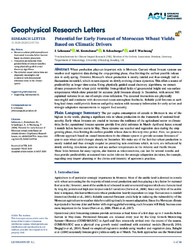Potential for Early Forecast of Moroccan Wheat Yields Based on Climatic Drivers
DOI: https://doi.org/10.1029/2020GL087516
Persistent URL: http://resolver.sub.uni-goettingen.de/purl?gldocs-11858/8896
Persistent URL: http://resolver.sub.uni-goettingen.de/purl?gldocs-11858/8896
Lehmann, J.; Kretschmer, M.; Schauberger, B.; Wechsung, F., 2020: Potential for Early Forecast of Moroccan Wheat Yields Based on Climatic Drivers. In: Geophysical Research Letters, Band 47, 12, DOI: 10.1029/2020GL087516.
 |
Dokument öffnen: |
Wheat production plays an important role in Morocco. Current wheat forecast systems use weather and vegetation data during the crop growing phase, thus limiting the earliest possible release date to early spring. However, Morocco's wheat production is mostly rainfed and thus strongly tied to fluctuations in rainfall, which in turn depend on slowly evolving climate dynamics. This offers a source of predictability at longer time scales. Using physically guided causal discovery algorithms, we extract climate precursors for wheat yield variability from gridded fields of geopotential height and sea surface temperatures which show potential for accurate yield forecasts already in December, with around 50% explained variance in an out-of-sample cross validation. The detected interactions are physically meaningful and consistent with documented ocean-atmosphere feedbacks. Reliable yield forecasts at such long lead times could provide farmers and policy makers with necessary information for early action and strategic adaptation measurements to support food security.
Statistik:
ZugriffsstatistikSammlung:
Schlagworte:
causal discovery algorithmsteleconnections
seasonal forecast
machine learning
wheat forecast
climate precursors
This is an open access article under the terms of the Creative Commons Attribution License, which permits use, distribution and reproduction in any medium, provided the original work is properly cited.

